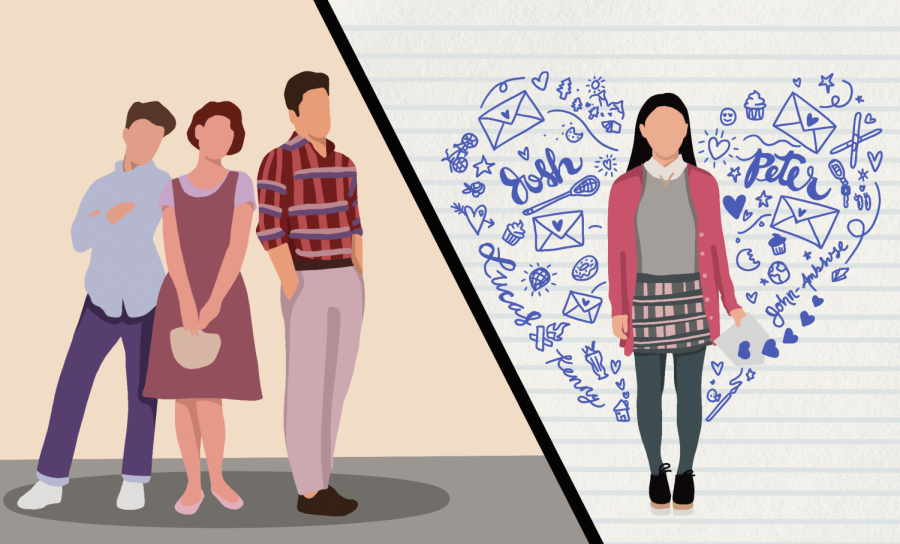Opinion | Romantic comedies convey problematic history
Mar 25, 2021
The romantic comedy, or rom-com, is a guilty pleasure for many – myself included. Movies within the genre have a comfortable and predictable progression through an endearing story, and they often provide a sense of escapism to a world with guaranteed happy endings. However, those seemingly easy paths to happily ever after do not come without a cost.
Although the genre is largely marketed towards women, even the most beloved rom-coms are often filled with misogynistic undertones. The women in rom-coms are largely reduced to a single dimension and do not attain fulfillment until they are somehow tied to a man. Overall, the characters exhibit toxic behaviors that are passed off as comedy or whimsy.
One of the worst culprits is the 1984 John Hughes movie “Sixteen Candles.” Decades have passed since the movie was first released, and I was not expecting it to match up perfectly with current societal standards. Despite being prepared for that potential disconnect, I was still horrified to see how sexist, racist, ableist and homophobic the movie was.
The movie tries to paint the male love interest Jake Ryan as swoon-worthy when he is anything but. “Sixteen Candles” seems to think that making Jake conventionally attractive and having him take interest in the female protagonist Samantha, or Sam, is enough to make him a dreamboat.
Jake treats his soon to be ex-girlfriend Caroline horribly. During a party, he bragged about how he could violate her while she was intoxicated and even jokingly encouraged another male to do “whatever (he) wanted” with her.
These jokes implicitly condone and normalize rape, passing it off as comedy. The male characters, including Jake, repeatedly harass and degrade women, especially when they are in vulnerable states.
Unfortunately, misogyny is not exclusive to male characters. In one scene, Sam and her friend watch an unknowing Caroline showering naked in the locker room. They then proceed to make disparaging comments about Caroline and her body.
It is a common movie trope for ex-girlfriends of male love interests to be viewed as mean girls or sluts in contrast to the sweet, innocent protagonist. Women are often pitted against each other, not because of their goals, but for male attention. This tendency pushes internalized misogyny, the idea that women should tear each other down to feel better about themselves.
“Sixteen Candles” is also incredibly racist. The portrayal of Long Duk Dong, a foreign exchange student, is caricature-esque. His appearances within the movie are announced with the sound of a gong, and wherever he goes he is uncool and out of control. He represents several harmful stereotypes against Asians and utilizes them as comedic relief.
Characters also throw around a gay slur and the r-slur, normalizing anti-LGBTQ and ableist sentiments. The representation for both the LGBTQ+ community and people with disabilities is already limited within Hollywood. Using such derogatory terms so casually makes hate against marginalized groups seem acceptable.
The supposedly happy ending, Sam and Jake ending up together, is insignificant among countless instances of unacceptable behavior. No amount of nostalgia attached to “Sixteen Candles” can compensate for the fact that it is an amalgamation of micro-aggressions and harmful stereotypes.
Some recent romantic comedies like the “To All the Boys I’ve Loved Before” trilogy have been able to overcome some of the problematic aspects of the genre. The movies are centered around an Asian American protagonist Lara Jean, a hopeless romantic that can often be caught reading romance novels and daydreaming.
However, Lara Jean is not limited to a single personality trait. Her character is multi-dimensional and has ambitions that she does not curb for the sake of her relationship. Part of the story is her navigating the differences between her expectations for love that was formed through romance novels and comedies and the reality of her situation.
Over the three movies, “To All the Boys” also moves past the mean ex-girlfriend trope. Although the hate between Lara Jean and her love interest’s ex, Gen, was central to the first two movies, by the third movie the two found ways to rebuild their friendship and support each other.
However, “To All the Boys” is not without its problems. Other than Lara Jean, there are very few people of color represented in the film. Lara Jean’s friend Lucas, one of the only African-American characters, also happens to be gay. With the lack of representation elsewhere, his presence feels like tokenism, giving only the illusion of diversity.
Furthermore, the first installment in the trilogy alludes to “Sixteen Candles” in a positive light. It even compares the male protagonist Peter to Jake Ryan. While they acknowledge Long Duk Dong’s portrayal was offensive in passing, the rest of the movie is referenced fondly.
Jake Ryan is once again given a free pass because he is hot, despite all of his glaringly toxic behavior. While “To All the Boys” feels like it is moving rom-coms in the right direction, its implicit acceptance of “Sixteen Candles” and all its issues are a huge step backwards.
Rom-coms offer a dreamy view of the world through rose-tinted glasses. While I appreciate their optimistic and whimsical nature, it is unclear whether the genre can entirely move past its problematic roots. Without significant progress, the fantasies can continue to bring about real-life consequences.
Rayna is a freshman in LAS.
[email protected]






